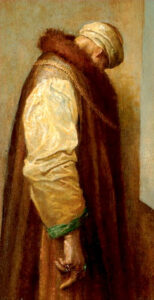Fr Neil’s homily for the Nineteenth Sunday after Trinity, 10 October 2021
Truly, I say to you, there is no one who has left house or brothers or sisters or mother or father or children or lands, for my sake and for the gospel, who will not receive a hundredfold now in this time… and in the age to come eternal life.¹
What is it that makes a person wealthy? At home we sometimes play the game, “What would we do if we won the lottery?” We talk about changes to our life and the many good projects we could support. Of course, this is a theoretical game because you have to participate in the lottery to stand the remotest chance of winning.
When we speak of wealth we often confine or limit it to material wealth, money in the bank, houses, cars and holidays etc. However, there is a deeper wealth that lies beyond material possessions. There has been many a father who has worked so hard to provide an abundance of material goods for his family but who in later life regrets the hours away from his children. He may realise one day that, while he was working so hard, they have grown up and left home. Reflective wisdom often wishes that a little less material wealth and more time spent with the children growing up would have led to an emotionally more stable and richer family life.
Material wealth is morally neutral, but it was a problem for the rich young man in today’s Gospel.² They say “Where your treasure is there your heart will be also”.³ The young man asks Christ a very important question, “What must I do to have eternal life?” He wants to know how he can be a member of the heavenly kingdom, animated by the life of God himself. Christ reveals that the way to eternal life is to put every other concern to one side and follow him. In this instance it meant the young man letting go of his wealth. Our Lord, like a master surgeon, identifies that which stops the young man from embracing the fullness of spiritual life of the kingdom. His way to freedom and full health requires radical surgery: “Go, sell what you have, and give to the poor, and you will have treasure in heaven; and come, follow me.”⁴
The young man’s heart was captured by his riches. How easy it is for things to control our acting, thinking and desires as if they will bring us happiness and our heart’s desire. This is sinful attachment. Christ, however, wishes to speak of a greater wealth that mere material things cannot give, for those who are able to let go, trust and follow him.
If there is one lesson that we should have learnt over the last two years, it is that wealth doesn’t reside in material things alone. We cannot underestimate the impact on those who have lost jobs, wages and even homes, as a result of the lockdown. The full effects haven’t been seen yet. However, many have seen their bank balances healthier than before the crisis, as they worked from home, didn’t go out eating, partying, drinking or go on holidays as usual. But the inability to meet with friends and family, to visit dying older relatives, see the new-born grandchild, has left a poverty of emotional and physical contact that has impacted so many people’s mental and spiritual health. What’s a few extra quid in the bank worth, if we cannot be with and hold our loved ones?
The writer of Hebrews uses the image of the Roman soldier’s double-edged sword — a very effective weapon that could slip between armour — to speak of the ability of the word of God to divide even soul and spirit.⁵ It is the revealed Word of God, embodied in Christ and empowered by the Holy Spirit that can, like the surgeon’s scalpel, free us from those unholy attachments that impede our embracing the full life of grace that Christ offers.
Most surgery is performed to remove and mend something that is affecting our physical ability and health. It is never pleasant, and can be painful and uncomfortable in our recovery, but we know it is necessary. Freeing ourselves from sinful attachments can also be painful and uncomfortable. But is necessary as those attachments stop us from embracing the fullness of life in Christ and a true desire to be united heart, mind and spirit with him who is life itself.
When we acknowledge and accept this necessity we touch the divine wisdom that allows a radical freedom from the material world so that we can seek the treasure that fulfils our deeper longing. We are all called by Christ to this freedom but it is most clearly manifested in the monastic tradition of the Church. Without knowledge of this longing for deeper wisdom that is so profoundly expressed in our first reading, the monastic life cannot be understood and will be seen as sheer madness.
I called upon God, and the spirit of wisdom came to me.
I preferred her to sceptres and thrones, and I accounted wealth as nothing in comparison with her.
Neither did I liken to her any priceless gem, because all gold is but a little sand in her sight, and silver will be accounted as clay before her.
I loved her more than health and beauty, and I chose to have her rather than light, because her radiance never ceases.⁶
It is only by letting go, and letting God act in our daily struggle, that we are able to have a foretaste of the manifold beauty of the life of the kingdom, and receive the riches promised by Christ.
¹ Mark 10:29–30
² Mark 10:17–30
³ Matthew 6:21
⁴ Mark 10:21
⁵ Hebrews 4:12
⁶ Wisdom 7:7–10








 Posts
Posts